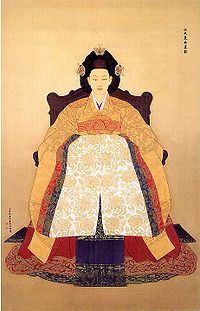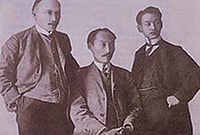.gif)
Den Haag (novel)
Encyclopedia
Den Haag is a 2008
mystery-detective
historical fiction
novel
written by South Korean author Ho Soo Kim and published by Philmac in South Korea
.
It follows the Pope
's envoy, Hugo(fictitious character), as he investigates a murder in Seoul in 2007 and discovers a terror plot of Japan's militaristic group. At the same time, the novel keeps track of the Korean Emperor's three secret delegates who are sent to Netherlands Peace Conference in 1907.
In 1907, at The Hague, Yi Jun, one of the three delegates died a mysterious death.
In 2007, at Seoul, a 10 year old child happened to die from an ill-defined brain disease. These two stories link together through the letter to Vatican sent by a veiled priest called 'Q(fictitious character)' and his activities.
This novel call our of today to account what is the historical meaning of Japan-Korea Forced Annexation a hundred years ago: Who am I, what left behind 'a time of Japanese forced occupation' to me of the present time, and in confronting such historical problems, how to eliminate the legacy of Japan’s colonial rule of Korea which have been restricting liberty and pride of Korean even now.
 In early morning of October 8, 1895, sword-bearing assassins allegedly under orders from Miura Goro(In 1895, Miura was appointed Japan’s resident minister extraordinary and plenipotentiary in Korea) entered Gyeongbok Palace(a palace located in northern Seoul, South Korea). Upon entering the Queen's Quarters (옥호루, "Okhoru, Geonchung Palace"), the assassins "killed three court [women] suspected of being Empress Myeongseong
In early morning of October 8, 1895, sword-bearing assassins allegedly under orders from Miura Goro(In 1895, Miura was appointed Japan’s resident minister extraordinary and plenipotentiary in Korea) entered Gyeongbok Palace(a palace located in northern Seoul, South Korea). Upon entering the Queen's Quarters (옥호루, "Okhoru, Geonchung Palace"), the assassins "killed three court [women] suspected of being Empress Myeongseong
. When they confirmed that one of them was the Empress, they burned the corpse in the pine forest in front of the Okhulu complex of the immense palace, and then dispersed the ashes."
After the assassination of Empress Myeongseong Korea effectively became a protectorate of Japan on 25 July 1905.
 The 1905 Protectorate Treaty having been promulgated without Emperor Gojong's required seal and had thus lost the right to conduct diplomatic exchanges with other countries. To protest Japan’s actions, Emperor Gojong of Korea sent three secret delegates, Yi Jun (이준), Yi Sang-Seol (이상설) and Yi Wi-Jong (이위종) to the Second Peace Conference at The Hague, Netherlands on 18 July 1907. However, the Great powers didn't allow the delegates to take part in the conference, so the delegates were unable to gain entry into the convention hall. And Yi Jun, one of the three delegates died suddenly on 17 July 1907.
The 1905 Protectorate Treaty having been promulgated without Emperor Gojong's required seal and had thus lost the right to conduct diplomatic exchanges with other countries. To protest Japan’s actions, Emperor Gojong of Korea sent three secret delegates, Yi Jun (이준), Yi Sang-Seol (이상설) and Yi Wi-Jong (이위종) to the Second Peace Conference at The Hague, Netherlands on 18 July 1907. However, the Great powers didn't allow the delegates to take part in the conference, so the delegates were unable to gain entry into the convention hall. And Yi Jun, one of the three delegates died suddenly on 17 July 1907.
After all, Korea was no longer viewed as an independent nation by the great powers, and Japan was seen as representing her on the international stage. Although the Korean delegates were blocked by the Japanese delegates, they did not give up, and later held interviews with newspapers.
Vladimir Sergeevich Li, Li Wi-Jong warned forebodingly of Japanese ambitions in Asia:
"The United States does not realize what Japan's policy in the Far East is and what it portends for the American people. The Japanese adopted a policy that in the end will give her complete control over commerce and industry in the Far East. Japan is bitter against the United States and against Great Britain. If the United States does not watch Japan closely she will force the Americans and the English out of the Far East."
2008 in literature
The year 2008 in literature involved some significant events and new books.-Events:*January 1 - In the 2008 New Year Honours, Hanif Kureishi , Jenny Uglow , Peter Vansittart and Debjani Chatterjee are all rewarded for "services to literature".*June 15 - Gore Vidal, asked in a New York Times...
mystery-detective
Detective fiction
Detective fiction is a sub-genre of crime fiction and mystery fiction in which an investigator , either professional or amateur, investigates a crime, often murder.-In ancient literature:...
historical fiction
Historical fiction
Historical fiction tells a story that is set in the past. That setting is usually real and drawn from history, and often contains actual historical persons, but the principal characters tend to be fictional...
novel
Novel
A novel is a book of long narrative in literary prose. The genre has historical roots both in the fields of the medieval and early modern romance and in the tradition of the novella. The latter supplied the present generic term in the late 18th century....
written by South Korean author Ho Soo Kim and published by Philmac in South Korea
South Korea
The Republic of Korea , , is a sovereign state in East Asia, located on the southern portion of the Korean Peninsula. It is neighbored by the People's Republic of China to the west, Japan to the east, North Korea to the north, and the East China Sea and Republic of China to the south...
.
It follows the Pope
Pope
The Pope is the Bishop of Rome, a position that makes him the leader of the worldwide Catholic Church . In the Catholic Church, the Pope is regarded as the successor of Saint Peter, the Apostle...
's envoy, Hugo(fictitious character), as he investigates a murder in Seoul in 2007 and discovers a terror plot of Japan's militaristic group. At the same time, the novel keeps track of the Korean Emperor's three secret delegates who are sent to Netherlands Peace Conference in 1907.
Plot summary
Den Haag (Korean: 덴하흐) is the Faction(fact+fiction) which is based on the historical fact of the Korean Empire's credential three secret delegates at the Second Peace Conference at The Hague in 1907. This story mingles three different incidents crossing time and space.In 1907, at The Hague, Yi Jun, one of the three delegates died a mysterious death.
In 2007, at Seoul, a 10 year old child happened to die from an ill-defined brain disease. These two stories link together through the letter to Vatican sent by a veiled priest called 'Q(fictitious character)' and his activities.
This novel call our of today to account what is the historical meaning of Japan-Korea Forced Annexation a hundred years ago: Who am I, what left behind 'a time of Japanese forced occupation' to me of the present time, and in confronting such historical problems, how to eliminate the legacy of Japan’s colonial rule of Korea which have been restricting liberty and pride of Korean even now.
Crisis of the Korean Empire
- the assassination of Empress Myeongseong of Korea

Empress Myeongseong
Empress Myeongseong , also known as Queen Min, was the first official wife of King Gojong, the twenty-sixth king of the Joseon dynasty of Korea...
. When they confirmed that one of them was the Empress, they burned the corpse in the pine forest in front of the Okhulu complex of the immense palace, and then dispersed the ashes."
After the assassination of Empress Myeongseong Korea effectively became a protectorate of Japan on 25 July 1905.
- The Korean Empire's credential three secret delegates

After all, Korea was no longer viewed as an independent nation by the great powers, and Japan was seen as representing her on the international stage. Although the Korean delegates were blocked by the Japanese delegates, they did not give up, and later held interviews with newspapers.
Vladimir Sergeevich Li, Li Wi-Jong warned forebodingly of Japanese ambitions in Asia:
"The United States does not realize what Japan's policy in the Far East is and what it portends for the American people. The Japanese adopted a policy that in the end will give her complete control over commerce and industry in the Far East. Japan is bitter against the United States and against Great Britain. If the United States does not watch Japan closely she will force the Americans and the English out of the Far East."

